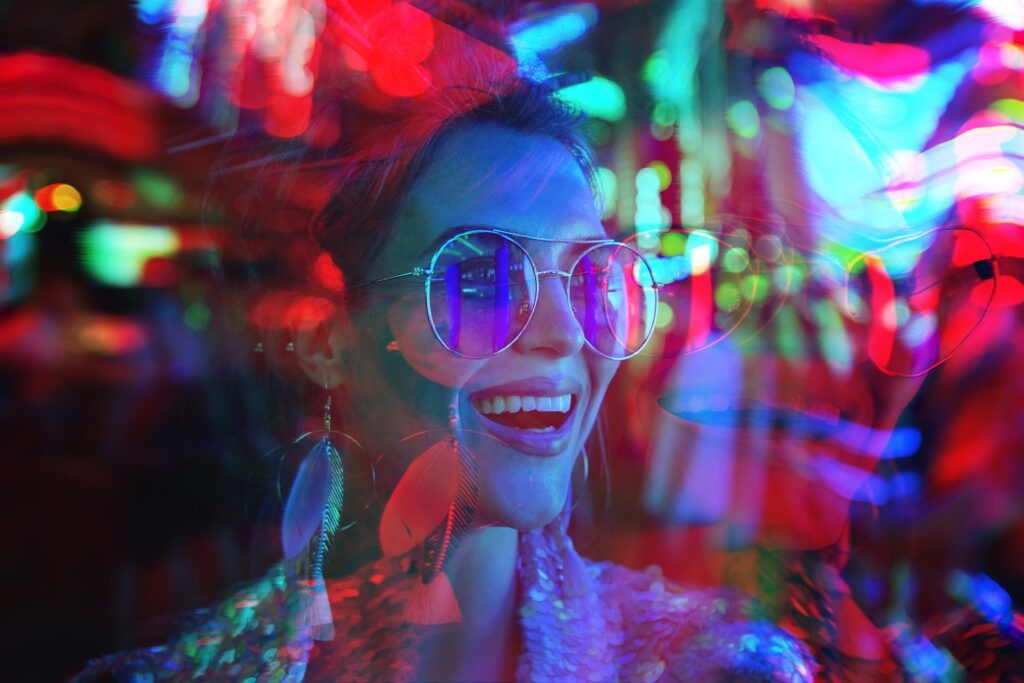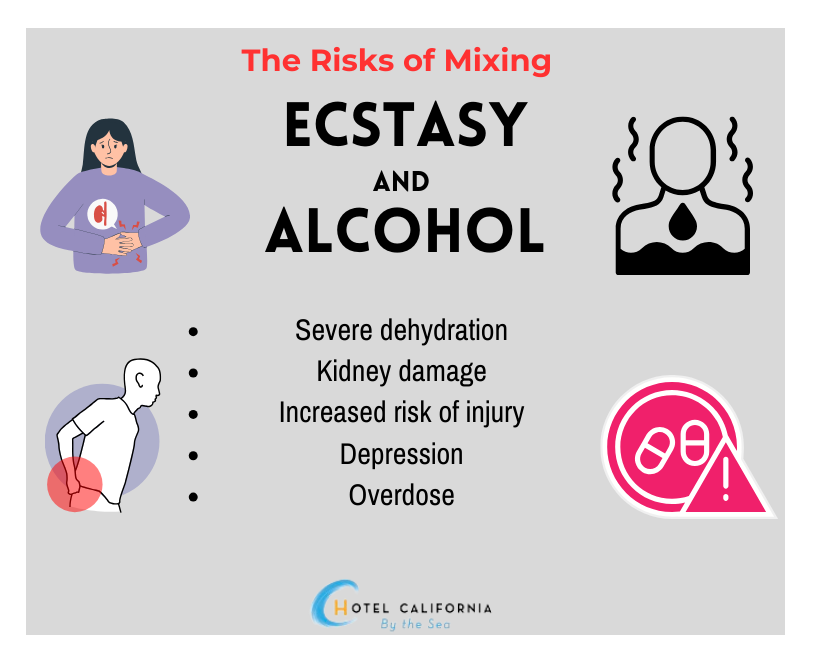Polysubstance Use: Alcohol and Ecstasy
Alcohol and ecstasy. It is a pretty popular drug combination among young people ages 18 to 34, partygoers and clubgoers alike. The idea behind mixing the two drugs is ecstasy will be able to cancel out the sedative effect of alcohol while intensifying the buzz and high from the ecstasy. Many partygoers believe alcohol can enhance their experience with ecstasy and prolong the effects of high energy, euphoria and connectedness. This might be a temporary effect, but in the long run, the combination of alcohol and ecstasy can cause dangerous side effects.

Alcohol is a central nervous system depressant. It works to slow down brain activity, which can also slow down cognitive functions and physical functions. It can cause impaired thinking and loss of coordination. Ecstasy, also known as MDMA or molly, is a central nervous stimulant drug. It can produce feelings of high energy, euphoria and minor hallucinogenic effects. When both substances are used together, it is also known as polysubstance use. The combination of these types of drugs can cause opposite and conflicting effects on the body.
More about MDMA
MDMA is a synthetic drug made from safrole oil. It affects chemicals in the brain and increases the release of serotonin and other neurochemicals. The Schedule I Controlled Substance has a high potential for abuse with currently no medical acceptance. MDMA in powder form sold as capsules is often referred to as molly, while MDMA sold as colorful tablets is referred to as ecstasy. Other street names include Adam, Blue Superman, Chocolate Chips, Happy Pills, Scooby Snacks, X, XTC and Beans. MDMA is often cut with other substances such as cocaine, meth or ketamine. This creates even more danger and unpredictability when using the substance.
MDMA is an empathogen. It increases a person’s feelings of empathy and connectedness and makes people feel a sense of closeness with others. It produces mild hallucinogenic effects and can distort perception and sensations. This is often the reason people tend to feel as if they have created a deep connection with others around them when they are taking MDMA. The onset of effects can begin within less than an hour and how long it lasts can be dependent on whether or not it has been mixed with other drugs such as alcohol.
The drug works by increasing three main brain chemicals: dopamine, serotonin and norepinephrine. Dopamine is a neurotransmitter brain chemical that increases energy and helps to reinforce certain types of behaviors. Serotonin is a brain chemicals that affects a person’s appetite, mood and sleep. Increased serotonin in the body can cause feelings of emotional closeness, elevated mood and empathy. Norepinephrine is another neurotransmitter that can cause elevated heart rate and blood pressure.

Side Effects of MDMA Abuse:
- Nausea
- Irritability
- Muscle cramps
- Chills
- Jaw clenching
- Depression and anxiety
- Impulsiveness
- Aggression
- Blurred vision and distorted sensory and perception
- Sweating
- Memory and attention problems
- Serotonin syndrome
Check Your Insurance Coverage for FREE
Find out if your insurance covers addiction treatment in minutes. We accept most insurance!
The impact of mixing Alcohol and Ecstasy
Mixing alcohol and ecstasy can cause intense, dangerous and unpredictable side effects. Among some of the most alarming outcomes from alcohol and ecstasy, the combination of both drugs can have a serious impact on vital organs such as the heart, liver, kidney and brain.
- Ecstasy causes hyperthermia and a rise in body temperature. When alcohol is added, it causes the body to become dehydrated, leading to the feeling of needing more alcohol to compensate. More alcohol means more dehydration, and more dehydration can even further raise body temperature causing heatstroke.
- Both molly and alcohol are metabolized in the liver. Too much alcohol can slow down the removal of ecstasy from the liver causing a toxic build-up of the drug. It puts more pressure on the liver to perform causing more damage as the liver works overtime in order to try and keep up with the drug consumption.
- Both drugs increase stress on the heart leading to high blood pressure and elevated heart rate.
- Both drugs impact thinking, and awareness and can impair mobility and coordination.
- The combination of ecstasy and alcohol can significantly increase levels of dopamine and serotonin in the brain causing low mood, depression and symptoms of overdose.
- Ecstasy can decrease alcohol’s sedative effects making a person feel more sober than they actually are. This can lead to more drinking because it damages the dopamine reward pathway.
- A 2002 study from the Journal of Pharmacology and Experimental Therapeutics found that interaction between the two substances increased the concentration of MDMA in the blood by 13%.
- Drinking alcohol causes drowsiness while taking MDMA causes hyperactivity. These opposing effects on the body occurring at the same time can cause harm to the body.
- When taking molly and alcohol together it makes it more difficult to know how much MDMA is in your system.
- Alcohol amplifies the effects of ecstasy, which can lead to mild hallucinations.
- The combination of alcohol and ecstasy can also lead to the development of depression and anxiety, panic attacks, faintness, confusion, headache and nausea, seizures, changes in mental state of mind, suicidal thoughts and behaviors and a high risk of overdose.
Why are people mixing Alcohol with Ecstasy?
- These two drugs are often used together because they are both highly accessible and readily available in certain environments such as nightclubs, concerts or rave parties. The combination is most commonly used among young people.
- These two drugs are mixed because some believe the alcohol can prolong the effects of euphoria and high from the MDMA. It intensifies the feelings of high energy, happiness, relaxation and connectedness with others around them.
- These two drugs are mixed because some people claim they can balance each other out and counteract the adverse effects of one from the other.
Reach out to Hotel California by the Sea
We specialize in treating addiction and other co-occurring disorders, such as PTSD. Our Admissions specialists are available to walk you through the best options for treating your addiction.
Looking for Treatment for Polysubstance Use Disorder?
The combination of alcohol and ecstasy can cause dangerous effects. The more serious effects include organ damage and even failure of the heart, liver and kidney. Ecstasy or MDMA can remain in the body for up to four days. Alcohol can remain detectable in the body for up to 24 hours. When combined, it can cause high strain on the liver to process the drugs properly leading to toxicity of both MDMA and alcohol. Both substances are highly addictive on their own. When taken together, it increases the risk of dependence and can even increase the risk of overdose.
Professional behavioral health treatment programs such as Hotel California by the Sea provide effective alcohol use disorder and substance use disorder treatments. We also specialize in treating polysubstance use in which a person may be dependent on more than one mind-altering substance.
Our program treats patients in all stages of recovery including detox, inpatient residential, partial hospitalization program and intensive outpatient program. We offer MAT and other forms of medication management for patients throughout recovery. We also utilize evidence-based treatment methods such as cognitive behavioral therapy, dialectical behavioral therapy and marriage and family therapy. The combination of medication treatments alongside cognitive treatments, allows clients to address every aspect of their addiction. Hotel California by the Sea provides the support, resources and treatments necessary for our clients to overcome their addiction.
References:
https://www.healthline.com/health/molly-and-alcohol
https://www.medicalnewstoday.com/articles/alcohol-and-molly
https://zinniahealth.com/substance-use/mdma/with-alcohol
https://riahealth.com/blog/can-you-drink-alcohol-take-molly-ecstasy-mdma
https://www.drugrehab.com/addiction/drugs/ecstasy/mixing-with-alcohol
https://shcs.ucdavis.edu/sites/g/files/dgvnsk7846/files/inline-files/Mixing-infographic_Final.pdf
